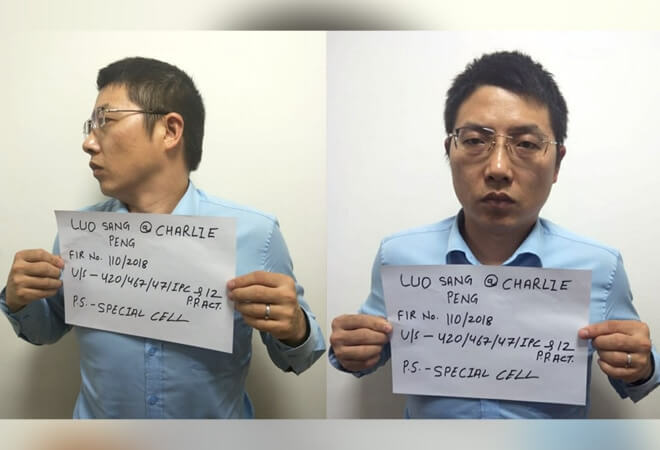A Chinese man lies at the centre of 1000 crore hawala scam that was uncovered by India’s Income Tax (IT) department last week. According to the Delhi Police, the accused, Luo Sang, used the fake name Charlie Peng to conduct his money laundering business. Apart from the hawala racket, a perturbing allegation against Sang includes attempts at bribing individuals near Majnu ka Tila, a Tibetan refugee colony in Delhi, to obtain information on the Dalai Lama. Lou Sang allegedly hails from Lhasa, Tibet, and frequently changed his place of residence in Delhi to conduct his money-laundering activities.
Specific reports purport that Sang ran at least five companies in India and was a majority stakeholder in each of them. These companies include Fin Block Private Limited, INWIN Logistics, OTA New Delhi Private Limited, and Clean Harbours Private Limited. The suspect ran these companies with another Aligarh-based businessman, Rahul Kumar.
Authorities have revealed that Sang illegally entered India through Nepal in 2014, taking up Indian identity through a fake passport issued in Manipur. Apart from a passport, he acquired an Aadhar and PAN card in the name of Charlie Peng and even married a local woman from Mizoram. Luo Sang, who studied in China’s Gulou district, did not hide his Chinese links. His social media profile indicates that he worked for China Galaxy Securities, a brokerage and investment bank based in China in 2008.
Authorities claimed that the communication for money-laundering racket occurred on the Chinese App We Chat, which the Indian government banned last month following border clashes with China. The IT department stated that large firms in China issued several fake purchase orders or “bogus bills” for smaller Chinese companies. Last year, Chinese media reported that, under a special campaign, China’s State Taxation Administration “cracked down” on crimes related to the use of fake invoices and export-tax rebate fraud. However, the report did not mention any links to money laundering in India or other countries. Furthermore, the prime accused, Luo Sang, was previously arrested in 2018 on charges of espionage. The allegations included that he was working for Chinese intelligence and was involved in hawala transactions through a Chinese based currency exchange company.
Sang was granted bail in 2019 and did not cease his fraudulent transactions. The Central Board of Direct Taxes (CBDT) has claimed that Sang used up to ten bank accounts, representing fake Chinese companies to launder up to INR 300 crores. Authorities have also maintained that Sang was able to conduct his operation with the help of employees in ICICI and Bandhan Bank, respectively. The IT department is currently conducting raids of the Chinese nationals, bank employees, and locals who worked with Sang. So far, authorities have seized several crucial documents and recovered INR 60-70 lakhs through two dozen raids conducted in the Delhi-NCR region.
In response to the tax raids, the Chinese Foreign Ministry spokesperson in Beijing stated that “the Chinese government requires Chinese companies to observe international rules, local laws and regulations while doing business overseas”. He added, “We are committed to safeguarding Chinese companies and nationals’ legitimate rights and interests.”
Last month, Indian Security agencies warned that China is indulging in cyber-attacks, economic espionage, and plans to recruit academicians and scientists worldwide to garner sensitive information. A report by Outlook alleged that “an alert was also issued in early January about Chinese cyber intrusion attempts at several companies where Indian researchers are working”. The report added, “The espionage attempt was to target UAV technology and certain top-end military equipment designs.” The hawala racket and espionage attempts, coupled with the border stand-off, is causing alarm in New Delhi against Beijing, impacting long-term bilateral relations.
Indian Authorities Arrest Chinese National in 1000 Crore Hawala Scam
Chinese national accused of spying on Dalai Lama and money laundering in New Delhi
August 17, 2020

Luo Sang, who assumed the Indian identity of Charlie Peng, was allegedly running a Hawala racket for the past 3 years. SOURCE: BUSINESS TODAY
